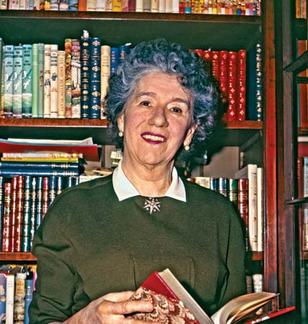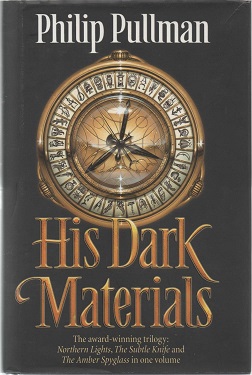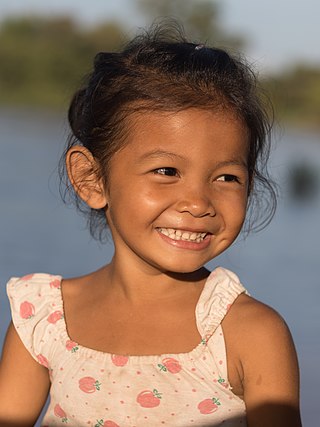Related Research Articles

Enid Mary Blyton was an English children's writer, whose books have been worldwide bestsellers since the 1930s, selling more than 600 million copies. Her books are still enormously popular and have been translated into ninety languages. As at June 2019, Blyton held the 4th place for the most translated author. She wrote on a wide range of topics, including education, natural history, fantasy, mystery, and biblical narratives. She is best remembered for her Noddy, Famous Five, Secret Seven, the Five Find-Outers, and Malory Towers books, although she also wrote many others, including; St. Clare's, The Naughtiest Girl, and The Faraway Tree series.

Sir Philip Nicholas Outram Pullman is an English writer. His books include the fantasy trilogy His Dark Materials and The Good Man Jesus and the Scoundrel Christ, a fictionalised biography of Jesus. In 2008, The Times named Pullman one of the "50 greatest British writers since 1945". In a 2004 BBC poll, he was named the eleventh most influential person in British culture. He was knighted in the 2019 New Year Honours for services to literature.

His Dark Materials is a trilogy of fantasy novels by Philip Pullman consisting of Northern Lights, The Subtle Knife (1997), and The Amber Spyglass (2000). It follows the coming of age of two children, Lyra Belacqua and Will Parry, as they wander through a series of parallel universes. The novels have won a number of awards, including the Carnegie Medal in 1995 for Northern Lights and the 2001 Whitbread Book of the Year for The Amber Spyglass. In 2003, the trilogy was ranked third on the BBC's The Big Read poll.

A toy or plaything is an object that is used primarily to provide entertainment. Simple examples include toy blocks, board games, and dolls. Toys are often designed for use by children, although many are designed specifically for adults and pets. Toys can provide utilitarian benefits, including physical exercise, cultural awareness, or academic education. Additionally, utilitarian objects, especially those which are no longer needed for their original purpose, can be used as toys. Examples include children building a fort with empty cereal boxes and tissue paper spools, or a toddler playing with a broken TV remote. The term "toy" can also be used to refer to utilitarian objects purchased for enjoyment rather than need, or for expensive necessities for which a large fraction of the cost represents its ability to provide enjoyment to the owner, such as luxury cars, high-end motorcycles, gaming computers, and flagship smartphones.
Anne Fine is an English writer. Although best known for children's books, she also writes for adults. She is a Fellow of the Royal Society of Literature and she was appointed an OBE in 2003.
Gender neutrality, also known as gender-neutralism or the gender neutrality movement, is the idea that policies, language, and other social institutions should avoid distinguishing roles according to people's sex or gender. This is in order to avoid discrimination arising from the impression that there are social roles for which one gender is more suited than another. The disparity in gender equality throughout history has had a significant impact on many aspects of society, including marketing, toys, education and parenting techniques. In order to increase gender neutrality in recent years, there has been a societal emphasis on utilizing inclusive language and advocating for equality.

Ladybird Books is a London-based publishing company, trading as a stand-alone imprint within the Penguin Group of companies. The Ladybird imprint publishes mass-market children's books.

A girl is a young female human, usually a child or an adolescent. While the term girl has other meanings, including young woman, daughter or girlfriend regardless of age, the first meaning is the most common one.

Mumsnet is a London-based internet forum, created in 2000 by Justine Roberts for discussion among people with child- or teen-aged offspring.
Michael O'Mara Books is a small, family-run, privately owned publishing house in the United Kingdom. Established in London in 1985, by an American expatriate, Michael O'Mara, a native of Philadelphia, Pennsylvania, and his British wife, Lesley, the company focuses on non-fiction books from autobiographies and memoir to colouring. O'Mara Books won the Independent Publishers Guild International Achievement Award in 2007 and the Lambeth Made Charter Mark Award for Best Apprenticeship Employer in 2021.
Holland Publishing PLC is an independent UK publishing house specialising in children's activity, sticker and colouring books. The company is based in Woodford Green, Essex, United Kingdom. The company was formed in 1980 by husband and wife, Bill and Sheila Holland.

Girls' toys and games are toys and games specifically targeted at girls by the toy industry. They may be traditionally associated either exclusively or primarily with girls by adults and used by girls as an expression of identity. One commentator have argued that the market for girl's toys and games is more challenging than that for boys' toys and games.

Lego Friends is a product range of Lego construction toys designed primarily for girls that was launched in 2012. It introduced "mini-doll" figures, which are about the same size as traditional Lego minifigures but are more detailed and realistic. The original cast consisted of Andrea, Olivia, Stephanie, Mia and Emma. The theme was relaunched in January 2023 to focus on a more diverse cast of characters: Aliya, Nova, Zac, Liann, Paisley, Leo, Autumn and Olly.
Pinkstinks is a campaign founded in London in May 2008 by twin sisters Emma Moore and Abi Moore to raise awareness of what they claim is damage caused by gender stereotyping of children. Pinkstinks claims that the marketing of gender-specific products to young children encourages girls to limit their ambitions later in life.
Gender roles are culturally influenced stereotypes which create expectations for appropriate behavior for males and females. An understanding of these roles is evident in children as young as age four. Children between 3 and 6 months can form distinctions between male and female faces. By ten months, infants can associate certain objects with females and males, like a hammer with males or scarf with females. Gender roles are influenced by the media, family, the environment, and society. In addition to biological maturation, children develop within a set of gender-specific social and behavioral norms embedded in family structure, natural play patterns, close friendships, and the teeming social jungle of school life. The gender roles encountered in childhood play a large part in shaping an individual's self-concept and influence the way an individual forms relationships later on in life.
A kidult is an adult whose interests or media consumption is traditionally seen as more suitable for children. It can also mean a parent who acts childishly with their children and does not take on their duties as a disciplinarian.

Let Toys Be Toys is a campaign designed to persuade retailers to stop categorising toys by gender. It was started by a group of parents on the parenting on-line discussion forum Mumsnet.
Lottie Dolls are a series of dolls created by Arklu Ltd. Launched in August 2012. Lottie promotes STEM subjects for kids and was even the first doll in space when she travelled to the International Space Station alongside British European Space Agency Astronaut, Tim Peake, on the Principia Mission, in December 2015.

The Ladybird Expert books is a series of titles for an adult readership intended to provide clear, accessible and authoritative introductions, informed by expert opinion, to key subjects drawn from science, history and culture.
Rebecca Hains is an American communication and media studies scholar and author. She is a professor in the Media and Communication Department at Salem State University and focuses her work on the subject of children's media culture and marketing, which she studies from a feminist media studies and critical/cultural studies perspective. She is a 2023–2024 Fulbright scholar.
References
- 1 2 3 Masters, Tim (17 March 2014). "Campaign over gender-specific books gains support". BBC News. Retrieved 24 November 2014.
- ↑ "Time to Let Books Be Books". www.lettoysbetoys.org.uk. 5 March 2014. Retrieved 24 November 2014.
- 1 2 3 Flood, Alison (7 March 2014). "Parents push to end gender division of boys' and girls' books". www.theguardian.com. Retrieved 24 November 2014.
- 1 2 Guest, Katy (16 March 2014). "Gender-specific books demean all our children. So the Independent on Sunday will no longer review anything marketed to exclude either sex" . The Independent on Sunday. London. Archived from the original on 2022-06-14. Retrieved 24 November 2014.
- ↑ Flood, Alison (20 November 2014). "Ladybird drops branding books 'for boys' or 'for girls'". www.theguardian.com. Retrieved 24 November 2014.
- ↑ "Ladybird drops gender-specific children's book titles". BBC News. 21 November 2014. Retrieved 24 November 2014.
- ↑ "More publishers agree to Let Books Be Books". www.lettoysbetoys.org.uk. 10 November 2014. Retrieved 24 November 2014.